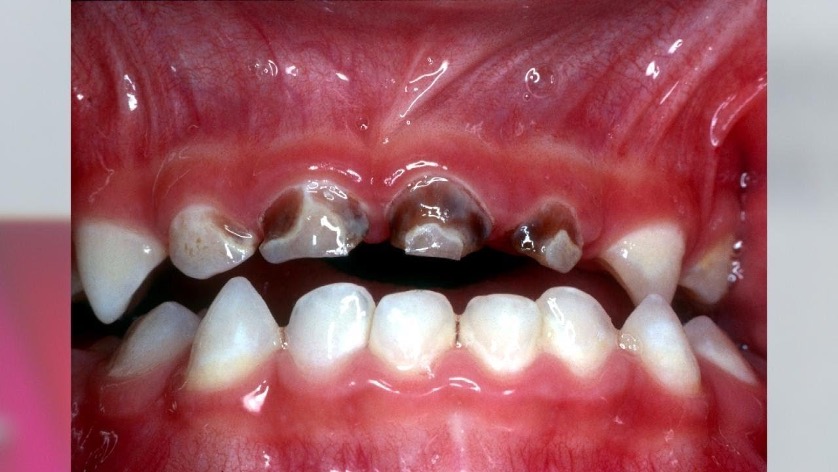Tooth decay is the most common chronic infection of children.
In infants it is referred to as nursing bottle caries or baby bottle tooth decay. One out of four infants suffer from tooth decay. This is a startling statistic!
In this issue we will discuss the disease referred to as Baby Bottle Caries.
Baby bottle tooth decay is a common disease of infants’ baby teeth. This usually occurs when parents or caregivers place infants to bed with the bottle in the mouth. This is done in an attempt to pacify the baby.
Because of the intimate contact of the upper front teeth with the contents in the bottle for a period of time, the sugar plus the bacteria causes acid development, leading to the erosion of the enamel. The enamel of baby teeth is much thinner than adult teeth. It is therefore much easier for the acid from bacteria to erode their enamel and form cavities.
Bacterial plaque builds up on teeth as early as 20 minutes after contact. If it not removed effectively, tooth decay begins.
Here are some facts about baby teeth:
- Baby teeth also get cavities and can cause pain, suffering, fever and medical infections.
- Early loss of an infant’s teeth could result in a negative experience that could affect their dental/medical outlook.
- The presence of baby teeth set the stage when lost naturally by making a pathway for the entrance in the mouth of healthy permanent teeth.
- Baby teeth are needed for normal facial development.
- Baby teeth are needed for biting and chewing and promoting proper nutrition.
- Baby teeth are needed for proper speech development, a natural smile and building of self-esteem.
Signs of baby tooth decay:
Cavities usually begin in the upper front teeth. It begins with white spots at the gumline. Often times, they are difficult to see so a dental visit is required.
Prevention and minimization of baby tooth decay:
- Sterilize the baby’s feeding utensils and keep separated from those of other family members.
- Keep the baby’s teeth and gums clean with a clean gauze or soft cloth.
- Brush the baby’s teeth using a grain of rice-size amount of toothpaste for children under age 3.
- Brush with a pea-size amount of fluoride toothpaste for ages 3 to 6 years. This should be supervised by an adult.
- Only use breast milk, formula or sterile water in bottles.
- Avoid placing sugary drinks, juices and sweetened water in the baby bottle.
- When the baby is napping, remove bottle from the mouth and out of the crib.
- Sterilize the pacifier and avoid dipping in sweets in an attempt to enhance taste.
- Try to get the child to use a cup by age 1.
- See a dentist by age 1, according to the American Academy of Pediatric Dentistry.
In conclusion, an ounce of prevention is better than a pound of cure. This ancient adage is applicable here. The cure may be associated with pain, suffering, trauma and considerable expense. Also, teeth and gum infections can lead to life-threatening situations.
Finally, you are responsible for the baby’s overall oral health and wellness.
Be proactive. Protect baby’s teeth and give them the best opportunity for healthy teeth and a healthy life.
Dr. Kendal V. O. Major is Founder and CEO of Center for Specialized Dentistry which is a comprehensive family dental practice operating in Nassau and Freeport. He is the first Bahamian Specialist in gum diseases and dental implants since 1989. He also is a certified Fast braces provider. His practice is located at 89 Collins Avenue, Nassau at (242)325-5165 or [email protected].

Baby Bottle Cavities- usually affect upper incisors

Early Signs of Baby Tooth Decay

Baby Bottle with Cow’s Milk and Pacifier





